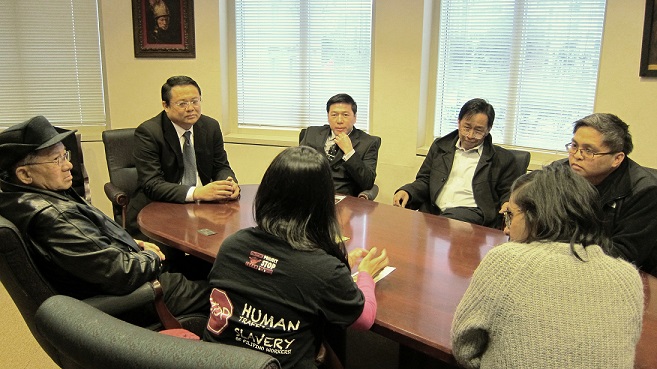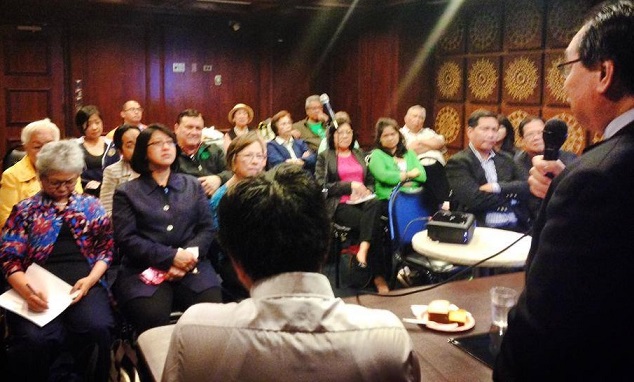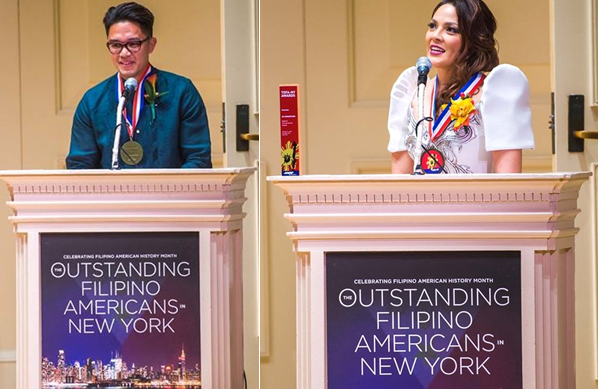In first dialogue, embassy officials and Grand Isle activists agree to disagree

Consul Elmer Cato (seated at the head of table) invites Grand Isle campaign activists to a dialogue. The FilAm photo
By Cristina DC Pastor
What began as a picket ended in a dialogue with both parties no closer to a meeting of the minds than where they started.
Philippine Embassy officials and leaders of migrant rights organizations sat across from each other on March 18th to discuss the fate of Filipino offshore oil workers in Louisiana who filed a human trafficking lawsuit against their employer. Both sides left the dialogue with positions unchanged.
While an embassy statement described the discussions as satisfactory, leaders of the Justice for Grand Isle Shipyard Filipino Workers Campaign said the embassy “shows a continuing lack of introspection and reflection on their work amongst migrant workers.”
In 2011, a group of Filipino offshore oil workers filed a class suit against their employers and recruiting agency, the Grand Isle Shipyard (GIS) and D& R Resources, respectively, with the Eastern District of Louisiana court. They alleged exploitative and discriminatory labor conditions. They said GIS did not honor their contract that the workers would be provided housing and transportation and paid the hourly rate of $16.25 for regular time, and $24.37 for overtime. There was also the unfulfilled promise that GIS would work toward a sponsorship of their green card. When they complained of the work conditions, they were “threatened with deportation,” according to court documents.
A November 16 explosion in the Gulf of Mexico drew attention to the workers’ conditions. Three Filipino workers of GIS were killed and three others were seriously injured in that explosion. Ambassador Jose Cuisia promptly visited the workers and offered assistance to the families of the victims.
“The embassy shares its concern for the rights and welfare of Filipino offshore oil workers here in the United States—not just those involved in the class suit against Grand Isle but also the majority who have not joined the case,” said First Secretary and Consul Elmer Cato, who represented the embassy in the first meeting with supporters of the workers.
With Cato were Welfare Officer Saul de Vries and Assistant Labor Officer Oliver Flores. The Justice for Grand Isle Shipyard Filipino Workers Campaign was represented by Dante Simbulan and Josef Calugay of the Katarungan Center for Peace, Justice and Human Rights in the Philippines, Katrina Abarcar and Ann Beryl Corotan of Philippine Forum and the National Alliance for Filipino Concerns.
Cato said the groups made impossible demands. They want the Philippine Government to shut down the companies for alleged illegal, inhumane and negligent business practices and for Ambassador Cuisia to step down for supposedly failing to take any action on the case, he said.
He discussed what the embassy had done in the events before and after the explosion:
• it helped shoulder the cost of recovering two of the first eight workers who left the Grand Isle facility in 2010
• it assisted in bringing to the U.S. families of the victims
• it offered other forms of assistance to the workers before and after they went to court with their lawsuit
• Cuisia requested the Occupational Safety and Health Administration to look into the living conditions of the remaining Filipino workers at the GIS facility
“We hope the embassy was able to present a clear picture of what the Philippine government has done and what it continues to do in protecting the rights and welfare of our workers,” he said.
Josef Calugay of Katarungan said he found the embassy’s position particularly “troubling.”
“Most troubling to me during the meeting was their insistence that they could not take action or be proactive without formal complaints or requests for assistance from the workers — hence their ‘monitoring’ stance for the past two years,” he said.
In accusing the Philippine government, through its embassies and consulates, of “neglect,” the groups said there is a “real contradiction between the Philippine government’s role as an aggressive marketer and exporter of its people and its responsibility to protect migrant workers.” The groups said waiting for workers to come forward “shows a clear lack of understanding of exploited workers or victims of abuse.” Fear of filing a complaint against one’s employer is very real, they asserted.
In the final analysis, the groups said the meeting did little to change their analysis that ultimately the Philippine government is the “number one human trafficker of the Filipino people.”
 Trust our award-winning law firm with your immigration case.
Trust our award-winning law firm with your immigration case.
Katamisán Cakes: French technique, tropical flavors. Weddings & special events. Click for info.











